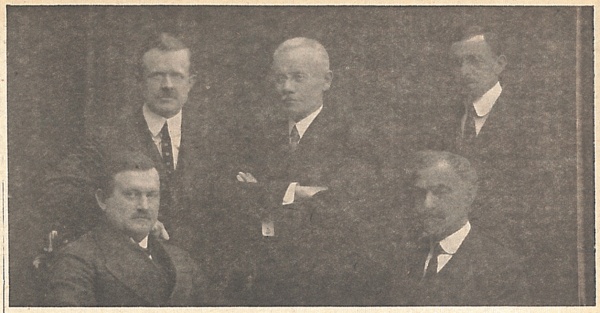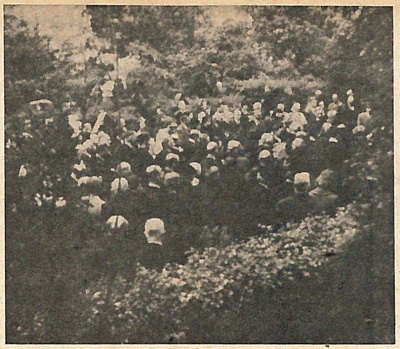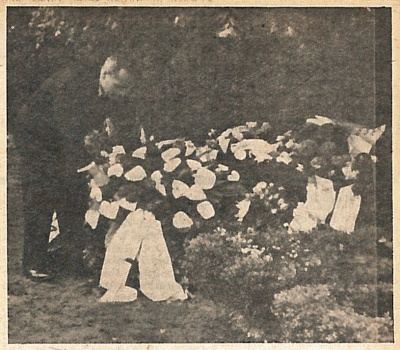If this site was useful to you, we'd be happy for a small donation. Be sure to enter "MLA donation" in the Comments box.
Unruh, Benjamin Heinrich (1881-1959): Difference between revisions
No edit summary |
No edit summary |
||
| (11 intermediate revisions by the same user not shown) | |||
| Line 5: | Line 5: | ||
text of obituary: | text of obituary: | ||
[[Image:Relief_workers.jpg| | [[Image:Relief_workers.jpg|600px|center]] | ||
<font size="+2">'''''Relief Workers After World War I'''''</font> | <font size="+2">'''''Relief Workers After World War I'''''</font> | ||
| Line 79: | Line 79: | ||
text of obituary: | text of obituary: | ||
[[Image:unruh_funeral_1959_1.jpg| | [[Image:unruh_funeral_1959_1.jpg|400px|left]] [[Image:unruh_funeral_1959_2.jpg|400px|right]] <br> | ||
<br> | |||
<br> | |||
<br> | |||
<br> | |||
<br> | |||
<br> | |||
<br> | |||
<br> | |||
<br> | |||
<br> | |||
<br> | |||
<br> | |||
<br> | |||
<br> | |||
<br> | |||
<br> | |||
<br> | |||
<br> | |||
<font size="+2">'''Funeral of Well-Known European Leader'''</font> | <font size="+2">'''Funeral of Well-Known European Leader'''</font> | ||
Latest revision as of 15:32, 17 April 2018
Mennonite Weekly Review obituary: 1959 May 21 p. 9
Birth date: 1881 Sep 17
text of obituary:

Relief Workers After World War I
Seated are B. H. Unruh (left), member of Studienkommission, and C. E. Krehbiel, relief worker. Standing are (left to right) P. C. Hiebert, relief worker, Johann J. Esau and Alexander Fast, both from Russia. B. H. Unruh and Johann J. Esau were members of the Studienkommission from Russia to investigate possibilities of emigration. C. E. Krehbiel and P. C. Hiebert were on their way to Russia to do relief work (1922). This was a meeting of the five men prior to the departure of Krehbiel and Hiebert to Russia via Constantinople. (Photo courtesy Mennonite Life.)
Work Of Prominent European Mennonite Leader Comes To A. Close
BENJAMIN A. [sic BENJAMIN H.] UNRUH PASSES AWAY
IT WAS in June, 1920, nearly forty years ago, that a Commission arrived in the United States reporting about conditions among the Mennonites of Russia. Outstanding in this group was Benjamin H. Unruh who spoke at the General Conference sessions in Pennsylvania and reported in various communities of the United States and Canada.
Hearts were moved with compassion, committees in existence became busy and new ones were organized to relieve the suffering of the brethren in Russia. This was the first official contact with the Mennonites of Russia after World war I and gave first-hand information about their conditions.
Special meetings were held in Newton, Kansas and Elkhart, Indiana. They led directly to the founding of the Mennonite Central Committee which was to become the official channel through which the many relief committees of the various Mennonite groups helped the Mennonites of Russia. Of this committee consisting of A. A Friesen, chairman, K. H. Warkentin, J. J. Esau and Benjamin H. Unruh, the latter was the most enthusiastic and forceful spokesman of the group. Friesen and Warkentin, who passed away some time ago, stayed in Canada and continued their work in behalf of the Mennonites of Russia.
UNRUH returned to Europe and established himself in Karlsruhe, Germany, where he remained the spokesman and negotiator in behalf of the Mennonites of Russia for many decades.
Friday, May 15, he too was laid to rest.
He was a contemporary, co-worker and adviser of a number of leading men in North America and the leader of the greatest of all Mennonite migrations between the two world wars. Among his early co-workers were David Toews, A. A. Friesen, (Canada), P. C. Hiebert, Orie O. Miller, C. E. Krehbiel, Maxwell H. Kratz (U.S.A.) and B. B. Janz (Russia). Files of letters to these men and of C. F. Claassen (Newton), P. P. Wedel and P. H. Unruh (Goessel) have been preserved in the Bethel College Historical Library.
His correspondence with these men relating his information from Russia and from his contact with government representatives and always marked “confidential” is dramatic, inspiring, and informative in content. It is a most valuable source of information pertaining to the great suffering of Mennonites of Russia and the migration of some to Canada and South America.
Particularly the flight via Moscow in 1929 is a climax in the work of the Moses of he Mennonites. Not only the files of his correspondence but also his autobiographical manuscript ”Fuehrung and Fuegung” contain information pertaining to these events. The lectures of Unruh which he gave at many occasions such as the World Conferences in Danzig (1930) and Amsterdam (1936), when he was made the representative of the total migration activities of the Mennonites, were always a great event.
UNRUH was a frequent speaker at German Mennonite conferences and youth meetings and preached in most of their churches. He was professor of the Technical School of Karlsruhe since 1932. He wrote many articles in various papers pertaining to the Mennonites of Russia, but his interests went far beyond this significant phase. He was vitally interested in theological and Biblical questions and wrote learned treatises along these lines. This interest went back to the days of his youth.
Unruh was born September 17, 1881, in the village Philippstal, Crimea, Russia where his father Heinrich Unruh was elder of a Mennonite church. He attended elementary and secondary schools in the Mennonite settlements and went to Basel, Switzerland in 1900 where he studied theology, education and literature for seven years at the Evangelical Seminary and the University of Basel. From the latter he graduated in 1907 with the degree Lic. Theol. (equivalent to Th. D.).
He was in close contact with the Mennonites of Switzerland and Germany and on August 8, 1907, he married Frieda Hege of South Germany. After his return to Russia he taught in the Halbstadt secondary schools, passed a Russian state examination and was also active at ministers conferences and in community work.
WHEN the Revolution broke out in 1917 he was one of the spokesmen of the Mennonites of the Ukraine. At a Mennonite Congress in 1917 he was appointed to various positions of responsibilities which finally led to his being commissioned with others as the “Studienkommission” to report in Western Europe and America about conditions in Russia and to seek settlement possibilities.
Unruh never returned to Russian [sic] although his love for Russia remained. His family followed him to Germany in 1922 where they resided in Karlsruhe. It consisted of four sons and four daughters. The youngest son lost his life during the last war. The other children are in various occupations. In 1946 Mrs. Unruh died. Later Benjamin H. Unruh married Paula Hotel. The Unruh home was always a model of hospitality.
Among his numerous books and articles is his most monumental book which deals with the historical background of the Mennonites of Russia which was published only a few years ago (The German title is as follows: Die niederlaendisch - niederdeutschen Hintergruende der Mennonitischen Ostwanderungen.
It probably is hard at this close distance to properly evaluate the contributions and the personal life of Benjamin H. Unruh. He was of unusual stature. Most of our Mennonites who have come from Russia have been little influenced by the slavic cultural traits and the Russian soul and psychology. Unruh seems to me, was an exception. His way of seeing things on a large scale, his enthusiasm, vision and sentiment revealed something of the depth of the Russian soul.
His lectures on Dostoevsky and other Russian literary figures were highly stimulating. This endowment made him most active and convincing. Later in his life when his vitality began to decrease his imagination and vision still continued on the former scale. This must have caused some problems in his later life. Others took over the leading role in the gigantic work pertaining to the relief and migration activities.
HIS heart and his thoughts, however, remained with his many friends and their well-being in all corners of the earth. His pupils from the schools in Halbstadt and those whom he led as a Moses through the Red Sea think of him praising the Lord for what He did through His servant for them. Whether this is on the farms in Canada or in the new settlements of Brazil or the Chaco they all think highly of him.
Those who worked with Unruh in the large-scale program of resettlement and feeding the hungry or those who worked with him in research feel deeply enriched in many ways because of his unselfish devotion which he was willing to offer at any time to those who sought his advise [sic] and counsel.
As a Christian worker and speaker he was always very stimulating, penetrating and enriching. He remained a Mennonite but had many friends among the leaders of other churches. One of his favorite phrases was that he “did not want to have fewer brethren and sisters than our Lord Jesus Christ has.”
Mennonite Weekly Review obituary: 1959 Jun 4 p. 9
text of obituary:


Funeral of Well-Known European Leader
The photo at left shows relatives and some of his many friends at the funeral of Prof. Benjamin H. Unruh, who died in Karlsruhe, Germany on May 12, 1959. At right, in the name of the Mennonite Central Committee, Peter J. Dyck places a wreath “in grateful remembrance” on the grave of Prof. Unruh. Born in Russia, Bro. Unruh was one of the five men of the Study Commission who came to North America in 1920 seeking help for the starving Mennonites of Russia. Subsequently, and in response to that call, the MCC was organized. Ten years later, Bro. Unruh gave invaluable assistance to Mennonites emigrating from Russia to South America, primarily Brazil, while they were “stranded” in Germany en route to their final destination. He is author of a number of books, the last one, “Fuegung und Fuehrung,” completed shortly before his death but not yet published. While Mennonites of Europe, Canada and South America remember Prof. Unruh in a special way, he was also well-known beyond Mennonite circles. His ecumenical thinking and activity is best expressed in his motto: “I want to have no less brothers than our Lord Jesus has.”